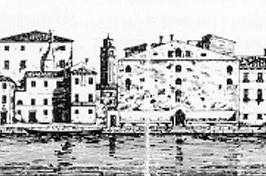Giovanni BatistaDraghi may refer to:
Giovanni Battista Pescetti was an organist, harpsichordist, and composer known primarily for his operas and keyboard sonatas. Musicologist and University of California, Santa Barbara professor John E. Gillespie wrote that Pescetti "stylistically stands as a bridge between Alberti and Domenico Scarlatti".
Giovanni Battista was a common Italian given name in the 16th-18th centuries. It refers to "John the Baptist" in English, the French equivalent is "Jean-Baptiste". Common nicknames include Giambattista, Gianbattista, Giovambattista, or Giambo. In Genoese the nickname was Baciccio, and a common shortening was Giovan Battista, Giobatta or simply G.B.. The people listed below are Italian unless noted otherwise.
Pacetti is an Italian surname. Notable people with the surname include:

Bianchini is an Italian surname. Notable people with the surname include:
Casali is an Italian surname. Notable people with the surname include:
Giovanni Fontana may refer to:
Giovanni Visconti may refer to:
Giovanni Rossi may refer to:
Giovanni Battista Lorenzi was an Italian librettist. He was born in Puglia and died in Naples and was a friend of Giovanni Paisiello, with whom he collaborated on numerous operas.

The Teatro San Angelo or Teatro Sant'Angelo was once a theatre in Venice which ran from 1677 until 1803.

Giovanni Battista Doria (1470–1554) was the 50th Doge of the Republic of Genoa.
Giovanni is a male Italian given name. It is the Italian equivalent of John. Giovanni is frequently contracted to Gianni, Gian, or Gio, particularly in the name Gianbattista, and can also be found as a surname. It is sometimes spelt as Geovanni, Giovonnie, Giovannie, Jiovanni, or, when used as an English name, its female counterpart is Giovanna.

Angelica and Medoro was a popular subject for Romantic painters, composers and writers from the 16th until the 19th century. Angelica and Medoro are two characters from the 16th-century Italian epic Orlando Furioso by Ludovico Ariosto. Angelica was an Asian princess at the court of Charlemagne who fell in love with the Saracen knight Medoro, and eloped with him to China. While in the original work Orlando was the main character, many adaptations focused purely or mainly on the love between Angelica and Medoro, with the favourite scenes in paintings being Angelica nursing Medoro, and Angelica carving their names into a tree, a scene which was the theme of at least 25 paintings between 1577 and 1825.
Giovanni Bianchi may refer to:
Ansaldo is an Italian name of Germanic origin. It was originally a masculine given name and was later also used as a surname.
Giovanni Costa may refer to:
Giovanni Battista Costa may refer to:

Federico Giovanni Battista Pescetto was an Italian politician and general. He was senator of the Kingdom of Italy and Minister of the Navy in the second Rattazzi government; in the same government he held the position of Foreign Minister on an interim basis.
This page is based on this
Wikipedia article Text is available under the
CC BY-SA 4.0 license; additional terms may apply.
Images, videos and audio are available under their respective licenses.




